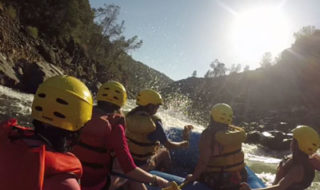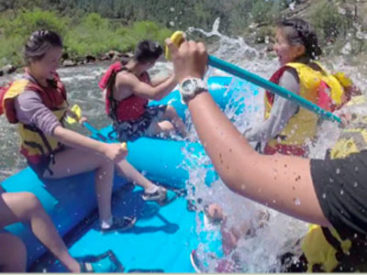Rush of wild nature lowers PTSD in veterans, at-risk teens
When Jet Garner socializes with fellow combat veterans who are studying at UC Berkeley, the conversation often turns to battlefield memories he’d rather forget.
But while whitewater rafting on the American River last summer, Garner and other members of the campus’s Cal Veterans Group were so busy having fun that the topic of their military past barely came up.
“It felt like we were really living in the moment,” says Garner, a veteran of two tours in Afghanistan who is majoring in political economy at UC Berkeley. “It really felt like we were moving on beyond our hang-ups.”
Garner, who has been diagnosed with post-traumatic stress disorder (PTSD), is among two dozen UC Berkeley student veterans whose psychological and physiological response to the awesomeness of big nature is being studied as part of a multi-year UC Berkeley research project.
Another group of Berkeley veterans will go rafting this summer as part of the study, thanks to the ongoing support of the Sierra Club’s Inspiring Connections Outdoors program, which provides the guides and the rafting equipment, and GoPro, which provides the cameras.

Led by Craig Anderson, a Berkeley doctoral student in psychology, the study is focused on changes observed in war veterans and, separately, in more than 90 inner-city Bay Area middle and high school students during and after one-or two-day whitewater rafting trips along the North Fork American River near Sacramento.
Anderson launched the study in 2014 and hopes to raise enough funding to continue it and follow up with participants over months and even years.
At least 400,000 veterans of the Iraq and Afghanistan wars have been diagnosed with PTSD. Symptoms include high stress, anxiety and depression and can lead to domestic violence, self-harm and even suicide. Similarly, PTSD has been recorded in untold numbers of residents of inner-city neighborhoods where gun violence is a common occurrence.
A prescription to get out in nature
Preliminary results of the study suggest that nature-inspired curiosity can trigger positive feelings and ease symptoms of PTSD in the most wary and withdrawn personalities.
Just one week after their rafting trips, for example, veterans reported a 30 percent decrease in PTSD symptoms. And both veterans and teens who had reported feeling a greater sense of awe during their rafting excursion later noted they got on better with friends and family.
“If doctors were able to write prescriptions for people to get out in nature, it would be one of the most cost-effective health interventions available, and would change our relationship to the outdoors,” says Anderson, a New Mexico native who has been an avid outdoorsman since his days as a Boy Scout.

Moreover, measures of stress hormones, immune function and dopamine regulators before, during and after the rafting trips, showed positive physiological changes in the study’s participants.
Researchers tested participants for pro-inflammatory cytokines, proteins that tell the immune system to work harder. They also measured levels of the stress hormone cortisol, which is thought to contribute to everything from inflammation to anxiety and memory loss.
Stress hormones can be helpful
Surprisingly, they found that higher levels of cortisol were correlated with more positive emotions after the river rafting trip.
“It’s an adaptive hormone. When we sit in front of computers being stressed out, cortisol doesn’t help us,” Anderson says. “But when we’re out in nature and we need more energy to achieve something physically demanding, cortisol goes up in a good way.”
Study participants were tracked via surveys, journals and footage from GoPro cameras attached to their helmets. Hundreds of hours of footage were coded based on facial expressions, body language and interactions.
While their emotions ranged from fear to joy, it was curiosity that most strongly aroused their desire to step outside their comfort zone and learn more about the world around them, especially for those accustomed to acting tough around their peers.
“If you’re in a rough neighborhood, it doesn’t pay to be open,” Anderson says. “You have to keep up a façade because if someone challenges you, you have to fight them. Otherwise you’re a pushover.”
So Anderson was heartened when one teenager who had initially resisted river rafting later asked him, “How could something scary feel so good?”
As for the veterans, Anderson was encouraged to see one former member of the armed forces, who had avoided swimming since his stint on a Swift Boat in Vietnam, frolicking in the water after a rafting trip.
The adrenalin rush and camaraderie of navigating the rapids while trying to stay inside the inflatable raft has left Garner feeling optimistic.
“I hope it’s something that sticks with me and helps me in the future as I recover from my experiences in the military,” he says.
The whitewater rafting study is being conducted under the auspices of UC Berkeley psychologist Dacher Keltner as part of a broader look at the psychological and physiological impact of awe. A presentation of the study is on the agenda of an all-day Art & Science of Awe conference on June 4 hosted by Berkeley’s Greater Good Science Center.
